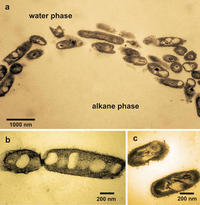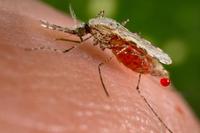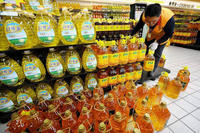-
Provision in House farm bill could postpone FDA food safety regulations
The largest overhaul of food safety regulations in the United States in more than five decades could be in danger as a result of an amendment in the farm bill that passed the House last week and sent to the Senate Tuesday. The House farm bill (H.R. 2642)has a provision requiring the Food and Drug Administration (FDA) to direct a “scientific and economic analysis” of the regulations under the Food Safety and Modernization Act (FSMA).
-
-
Disruption of maize trade would have global ramifications

Maize is at the center of global food security as growing demands for meat, fuel uses, and cereal crop demands increase the grain’s pivotal importance in diets worldwide. Disruptions to U.S. exports of maize (corn) could pose food security risks for many U.S. trade partners due to the lack of trade among other producing and importing nations. This is particularly true in nations like Mexico, Japan, and South Korea that have yet to diversify their sources.
-
-
Addresses trade-offs between food security, greenhouse gas emissions
Agriculture and land use change contributed about 1/3 of total human greenhouse gas emissions in the past decade, through crop cultivation, animal production, and deforestation. Improving agricultural productivity could help cut greenhouse gas emissions from agriculture, a new study shows, but sustainable farming methods are key.
-
-
Lawmakers uneasy about Smithfield’s acquisition by a Chinese food giant
Lawmakers last week questioned Smithfield Foods CEO Larry Pope about the proposed acquisition of the pork producer by China’s largest meat producer. Lawmakers are worried that the acquisition will negatively affect U.S food supply and agricultural producers.
-
-
U.S., South Korea teaming up for bioterrorism exercise
Officials from the United States and South Korea were in Seoul, South Korea last month for the third annual joint anti-bioterrorism exercise in Seoul. Around eighty U.S. officials and between 120 and 130 South Korean military officials participated in the tabletop exercise.
-
-
Brazil’s problem: abundant grain, inadequate storage
Tropical climates that allow for year-round farming would seem to be a tremendous economic advantage, but for corn and soybean farmers in the Brazilian state of Mato Grosso it also poses a problem — an abundance of grain followed by about a 10 percent postharvest loss, partially due to a lack of storage.
-
-
Oil-devouring microbe communities a mile deep in the Gulf

The Deepwater Horizon explosion on 20 April 2010, caused the largest marine oil spill in history, with several million barrels of crude oil released into the Gulf of Mexico over the course of three months. Soon after the spill began, a massive oil slick was visible from orbiting satellites, yet once the underwater gusher was sealed, obvious traces of the crude oil disappeared much sooner than nearly all observers predicted. Some of the oil evaporated; some was skimmed off. Microbes “ate” much of the oil as well.
-
-
New way found to battle mosquitoes carrying diseases

In the global war against disease-carrying mosquitoes, scientists have long believed that a single molecular door was the key target for insecticide. This door, however, is closing, giving mosquitoes the upper hand. In a study published this week, a team of researchers has discovered a second gateway that could turn the tide against the mosquitoes’ growing advantage.
-
-
Treating oil spills with chemical dispersants may do more damage than good
Treating oil spills at sea with chemical dispersants is detrimental to European fisheries. Post-spill chemical dispersants may reduce problems for surface animals, but the increased contamination under the water reduces the ability for fish and other organisms to cope with subsequent environmental challenges.
-
-
Researchers highlight problem of legacy mercury in the environment

Researchers have published evidence that significant reductions in mercury emissions will be necessary just to stabilize current levels of the toxic element in the environment. So much mercury persists in surface reservoirs (soil, air, and water) from past pollution, going back thousands of years, that it will continue to persist in the ocean and accumulate in fish for decades to centuries, they report.
-
-
Increasing food production from existing farmland
A policy known as sustainable intensification could help meet the challenges of increasing demands for food from a growing global population. The goal of sustainable intensification is to increase food production from existing farmland. Sustainable intensification would minimize the pressure on the environment in a world in which land, water, and energy are in short supply.
-
-
Antibiotic from a marine microorganism is effective against anthrax
A new potential drug from a marine microorganism is effective against anthrax. Researchers have isolated a species of Streptomyces from near-shore sediments near Santa Barbara, California. The culture extracts demonstrate significant activity against anthrax.
-
-
Improving crop resilience, yields in a world of extreme weather
Farmers in the United States witnessed record-breaking extremes in temperature and drought during the last two summers, causing worldwide increases in the costs of food, feed and fiber. Indeed, many climate scientists caution that extreme weather events resulting from climate change is the new normal for farmers in North America and elsewhere, requiring novel agricultural strategies to prevent crop losses. UC Riverside-led research team develops new chemical for improving crop drought tolerance.
-
-
Radiation dose passengers receive from airport scanners is low
An independent task force examining X-ray backscatter scanners at LAX airport determines that that people absorb less radiation from airport X-ray backscatter scanner than they do while standing in line waiting for the scan.
-
-
Rapid, on-site detection of illegal cooking oils

In recent years, illegal cooking oil incident in China caused serious food safety risks. Researchers have developed two rapid and convenient colorimetric detection methods of illegal cooking oils based on phase transfer technology.
-
More headlines
The long view
We Ran the C.D.C.: Kennedy Is Endangering Every American’s Health
Nine former leaders of the Centers for Disease Control and Prevention (CDC), who served as directors or acting directors under Republican and Democratic administrations, serving under presidents from Jimmy Carter to Donald Trrump, argue that HHS Secretary Roert F. Kennedy Jr. poses a clear and present danger to the health of Americans. He has placed anti-vaxxers and conspiracy theorists at top HHS positions, and he appears to be guided by a hostility to science and a belief in bizarre, unscientific approaches to public health.
